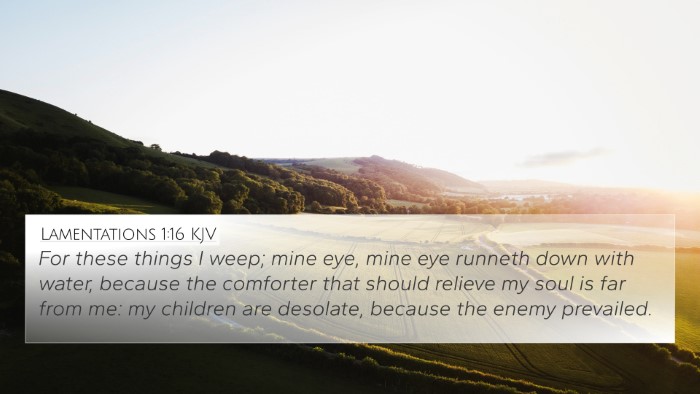Lamentations 3:17 - Verse Meaning and Interpretation
This passage is from the book of Lamentations, traditionally attributed to the prophet Jeremiah. Lamentations is a poetic reflection on the deep sorrow and suffering experienced by the people of Israel after the destruction of Jerusalem. In this context, Lamentations 3:17 states:
"You have removed my soul far from peace; I have forgotten prosperity."
Context and Background
The Book of Lamentations is structured as a series of laments mourning the destruction that has befallen Jerusalem. This particular verse expresses a profound sense of loss and despair. The speaker, likely representing the collective cry of the people, laments the absence of peace and the memory of prosperity that once was.
Summation of Insights from Public Domain Commentaries
Matthew Henry's Commentary
Henry emphasizes the emotional turmoil experienced: This verse articulates the feeling of distance from peace, which can be understood as a spiritual crisis. The author reflects on how calamity has led to a forgetfulness of joy and well-being. Henry points to the necessity of remembering God's former blessings when one is engulfed in darkness.
Albert Barnes' Notes
Barnes notes the depth of despair: The phrase 'removed my soul far from peace' indicates a profound alienation from tranquility, suggesting not just physical turmoil but also spiritual desolation. He ties this to the broader theme of exile, where a sense of loss of prosperity ties directly to the covenant blessings that Israel has forfeited due to disobedience.
Adam Clarke's Commentary
Clarke brings in the theological perspective: The forgetfulness of 'prosperity' highlights the consequences of breaking faith with God, resulting in a spiritual amnesia about God's past provisions. Clarke points out that this loss isn't simply personal but reflects a collective experience in the nation's history.
Bible Cross References
Understanding Lamentations 3:17 also involves looking at related scriptures to discern themes and connections. Here are several relevant cross-references:
- Isaiah 57:21: "There is no peace, says my God, for the wicked." This verse connects with the absence of peace mentioned in Lamentations, pointing to the spiritual state of the people.
- Psalms 42:5: "Why are you cast down, O my soul? And why are you in turmoil within me?" This verse reflects a similar experience of despair and longing for peace.
- Jeremiah 14:19: "Have you utterly rejected Judah? Does your soul loathe Zion?" This reflects the national lamentation seen in Lamentations.
- Lamentations 5:16: "The crown has fallen from our head; woe to us, for we have sinned!" This emphasizes the connection between sin, loss, and the absence of prosperity.
- Micah 3:9-12: Discusses the consequences of injustice that leads a nation to despair.
- Romans 5:1: "Therefore, since we have been justified by faith, we have peace with God through our Lord Jesus Christ." This contrasts the turmoil of Lamentations and points to the peace available through faith.
- Philippians 4:7: "And the peace of God, which surpasses all understanding, will guard your hearts and your minds in Christ Jesus." An excellent tie to the promise of peace for believers amidst turmoil.
Thematic Connections and Summary of Understanding
The themes encompassed in Lamentations 3:17 can be understood within various theological frameworks:
- Spiritual Desolation: The verse encapsulates a state of distancing from God that results in the loss of peace and prosperity.
- Collective Experience of Pain: It's not merely an individual's lament but a representation of a community's suffering.
- Call for Remembrance: It reminds believers to remember God's past faithfulness and blessings, especially in dark times.
- Moral Responsibility: The connection between the despair of the present situation and the disobedience of the past underlines the covenant relationship between God and His people.
Conclusion
Lamentations 3:17 serves as a poignant reminder of the effects of sin, exile, and the longing for divine restoration. By connecting it with the broader scriptural narratives through cross-referencing, believers can grasp its significance and apply its lessons. Understanding such a verse through cross-references enhances one's spiritual journey, encourages deeper study, and fosters a connection with God’s word despite suffering.
Further Study
For those seeking further understanding of Lamentations 3:17, consider exploring how to find cross-references in the Bible with tools like a Bible concordance or cross-reference guide. Engaging with comparative Bible verse analysis can illuminate parallel themes and deepen your understanding of God's messages throughout scripture.














